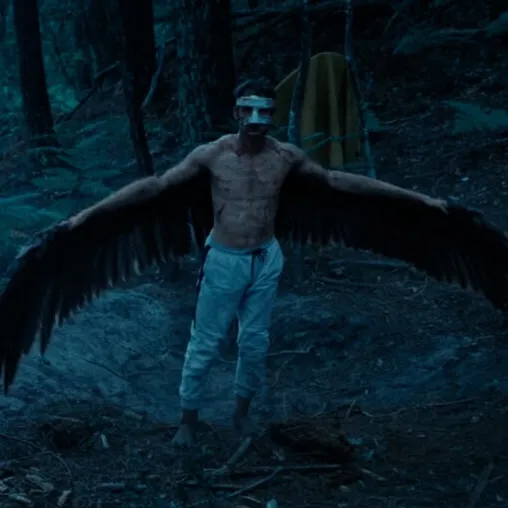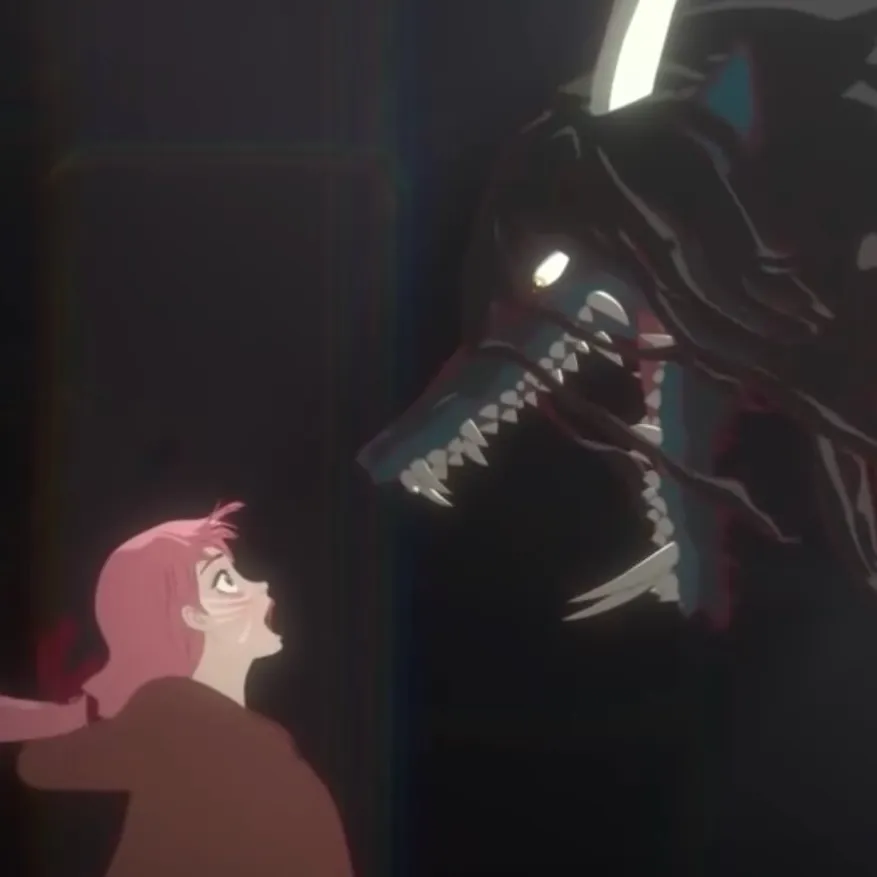On the surface, the plot of this movie could be an episode of CSI or Law & Order, and that’s what makes it so watchable. But it dives much deeper than the typical crime procedural, and shows how the criminal justice system rests on taking a tiny slice of people’s lives, and inventing a narrative and motive out of it. Of course, those lives, and especially the relationships in those lives, are much more complex.
There’s a memorable flashback scene featuring one of the ugliest couple fights I’ve ever seen. They’re both writers, and they resent each other for how time is spent towards their creative pursuits. On the one hand, it’s become a pet peeve of mine for stories to feature the writing profession. (Can’t writers write about something other than writing?) But on the other hand, the feeling of not having enough time to write—and especially the temptation to blame the people in your life for it—hits pretty close to home for me.
letterboxd link
Entertaining to watch, and gives you reason to root for a group of young activists, even if their actions undoubtedly lie in a moral grey area. In the end, though, the web of their backstories feels more like a point-form enumeration through the harms of corporate-backed climate change, rather than the lives of fully realized characters.
Your mileage may vary with the retro aesthetic. Personally, I don’t love the gritty 16mm look.
letterboxd link

I saw this film as part of the TIFF Secret Movie Club program. The screenings have that film festival feeling, because we’re seeing movies before wide release. Also, they’re often capped by a Q&A session with part of the filmmaking team. For the screening of The Animal Kingdom (a.k.a. Le Règne Animal), we were told before the show that there’d be a recorded interview with the sound supervisor at the end. Because of this fact, I tried to tune into the auditory experience, and indeed, it’s one of the notable technical achievements of the film.
In the story, people have started to randomly mutate into Dr. Moreau-esque animal hybrids. We follow a family whose matriarch has begun this transformation, and has disappeared into the wild, while the father and son try to get her back—both in the sense of physically locating her, and in the sense of “curing” her and making her human again. The tension mounts further when the townspeople get their pitchforks ready, and further still when the boy shows signs of mutation too.
The designs of the hybrids are cool, and brought to the screen mostly by performance and prosthetics. The aforementioned sound design comes into play in the way the creatures blend their human speaking voices with animal sounds.
Sci-fi-grounded-in-reality is probably one of my favourite things, and I enjoyed the film on its technical achievements and plotting. However, the allegorical elements felt too broad to be effective. It only points at subjects like racism, queerness, environmentalism, without really diving into any. Honestly, it covers a lot of the same thematic ground as X-Men, but without the luxury of time that a long-running series affords.
letterboxd link
I admired the visuals and animation of this film by Mamoru Hosoda. The design of “U”—a metaverse-like world with billions of users—is suitably grandiose and chaotic. I personally would never want to spend time in a virtual environment like that… I’m sure I would vomit from motion sickness within minutes. But that’s just me.
Unfortunately, the story fell flat for me. For most of the runtime, the plot happening inside U—featuring the mysterious Beast character—felt disconnected from the plot happening in the real world, which mostly involved the teenage romance angst that I see a lot of in anime. And the climax really stretches believability, requiring two characters to find each other at the exact same time at the exact same place in the middle of Tokyo.
letterboxd link

I would describe this film as an “artsy rom-com,” and I mean that as a compliment. I really connected to the introverted main character Fran, who struggles to insert herself into the superficialities of office social life. Fran is me: I’m certain that I, like her, have grabbed a slice of cake from the office party and left to enjoy it at my desk alone. And when a new coworker joins the team, and you have to go around the table and say a little something about yourself, I have also waited my turn in dread, and just blurted out my introduction to get it over with.
But what really makes me feel like Fran is me and I am Fran is what happens between her and this new coworker. It made me reflect that the most valuable relationships in my life have been with people who bring me out of my shell. Sometimes I find the phrase come out of one’s shell to be misleading, as if once you’re out, you’re out and there’s no going back. More accurate is the continuous tense: I will always be coming out of my shell, and I must appreciate the people who make it just a little bit easier.
(Aside: when I was drafting this post, I omitted the last word of the title, so that anyone looking over my shoulder at my screen wouldn’t get the wrong idea, i.e. Look at that guy… is he writing a suicide note? It’s a provocative title to be sure, and I was weary going in that it would be dark, but to my relief, the tone of the movie is more quirky than dreary. I wouldn’t necessarily say that Fran is suicidal, more that she wonders whether she would be missed if she were dead.)
letterboxd link
Emma Stone is iconic in this: bizarre costumes, spastic dancing, robotic walking, and especially dialogue. I love it when language is written in an off-kilter but still understandable way (see George Saunders, Milkman), and Stone’s delivery of her lines is delightful, especially when speaking bluntly about sexual matters. Which, by the way, maybe there are too many sex scenes… I don’t mean that in a prudish way, just that it gets a bit repetitive after a while.
letterboxd link
Is this a trilogy or are they making more of these?
I didn’t expect to like these much, as their reputation is not great, but I had a good time. I’ve not read much Agatha Christie, but she’s legendary for a reason. I think the source material is strong enough to save these movies from their filmmaking flaws.
People seem to dunk on Death on the Nile in particular, but it was actually my favourite. The character relationships have real emotional weight, especially because one of the victims is personally connected to Poirot.
Murder on the Orient Express, on the other hand, has too many characters to connect together. It probably works way better in book form. But what a stacked cast!
A Haunting in Venice is effectively creepy. It seems that Brannagh was trying to be creative with all the wide-angle lenses and weird camera angles. I say, go for it, Kenny! It worked for Thor, remember that?
letterboxd links: 1 2 3
On the one hand, there’s a surprising amount of emotional and political depth here, to make the monster action scenes more impactful. The film doesn’t shy away from criticizing the idea of honourable sacrifice, which as I understand it, is deeply ingrained in Japanese culture, and gives us things like sepukku and kamikaze.
On the other hand, my enjoyment was dampened a bit by the acting style, which leans towards the melodramatic. There’s also a toddler who, when she cries, seems to have been dubbed over with the sound of an infant crying.
letterboxd link
I got some disappointing personal news just before Christmas which, paired with the free time that the holidays bring, meant that I was looking for some cinematic comfort food to pass the days. The MCU has been pretty weak since the end of “Phase 3”1, and I had not revisited these last two Avengers entries since Endgame came out in 2019.
I was just as impressed as I was when I first saw them: it’s like watching the finale of a long-running TV series. Endgame especially rewards the loyal viewer with bittersweet character moments.
File these away to revisit again every few years…
letterboxd links: 1 2
Biopics work best for me when I know nothing about their subject. Such was the case for The Iron Claw, which tells the story of the Von Erich family of pro wrestlers. The film is well-directed and well-acted, and I was sucked into wanting to know what happens next. The amount of tragedy that the family endured is almost unbelievable. However, I have to say that it left little emotional impact on me. I should have been bawling throughout the film, but I wasn’t.
letterboxd link










